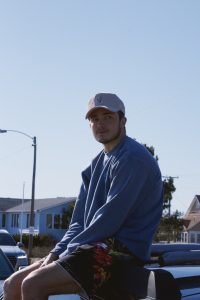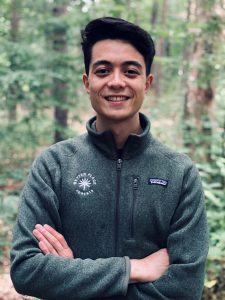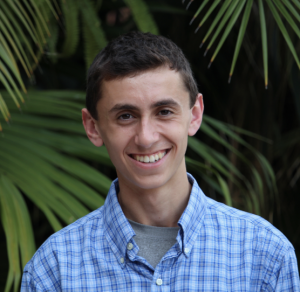The worldwide pandemic has meant the end of many summer opportunities for undergraduate students.
But three of UConn’s rising seniors – all members of the inaugural cohort of Werth Innovators, student ambassadors for entrepreneurship and innovation through the Peter J. Werth Institute for Entrepreneurship & Innovation – have embraced online work with three very different summer experiences while seeking to develop new skills, learning more about potential career options, and dipping their toes into mainstream popular culture.
The World of Wealth Management
He’s already been an entrepreneur – starting and managing his own company while still attending high school in Minnesota – but Benjamin Grosse ’21 (BUS) says he doesn’t really know what he wants to do after he graduates next year.
He’d never considered a career in finance, but spending the last several weeks working remotely as an intern with IEQ Capital – an asset management company co-founded by UConn alum Rob Skinner ’93 (CLAS) – has given him some new perspective on the world of personal finance.

“I went into this internship being like, I’m going to do a good job, I’ll be a value–add, I’m going to learn a lot, but I don’t know if this is what I want to do,” he says. “And through this, I’ve learned that I’m really interested in this space, and finance in general.”
Part of a cohort of 12 interns at the relatively small, but highly successful firm, Grosse has been tasked with undertaking research on alternative investments – investigating the finer details of different private equity funds, secondary funds, opportunistic funds, and others – to evaluate whether they are sound or risky and to better understand the assets that constitute the potential investment.
“Looking at everything holistically, being able to get a sort of a top-down view of the finance industry, but also the outlook of the entire economic system has been great,” says Grosse. “Whether I go into this or not, this is something that I’ve now got to take with me.”
He’s also interfacing with some of the firm’s clients and contributing to a database that centralizes information about all assets within an investment fund. He’ll continue working with the firm through the end of July, and has benefitted from access to high-level CEOs and what he said was the “phenomenal job” that IEQ has done in taking its traditionally in-person internship program virtual this year.
Grosse says the Werth Institute helped him make the connections that led to his internship, but that the value of the institute goes well beyond alumni relations.
“There’s a lot of people from all different backgrounds within the Werth Institute,” he says, “and a lot of people who study different things. The perspective that you get and that you’re aware of is incredible, and, in this day and age, that’s extremely important. You don’t want an organization that’s just a bunch of plain, cookie-cutter people who all have the same background, who all think the same way.”
Full Stack and a Conservation Memorial Forest
Zachary Zambuto ’21 (ENG) wants to make an impact on the world. Right now, he’s doing just that with a startup company that is disrupting the traditional notion of a burial plot.
“Meaningful work is really important to me,” says the computer science and engineering student, who is working remotely from Simsbury for a California-based startup through the True Ventures TEC Fellowship. The fellowship pairs undergraduate students with a company in their portfolio for a 10-week internship opportunity.
For his placement, Zambuto is working with Better Place Forests, which maintains three forests in California and Arizona where, instead of buying a traditional cemetery burial plot, individuals can choose to have their ashes spread at the base of a memorial tree that will be preserved in their honor in perpetuity.

“The really interesting thing is this hasn’t been innovated on for a really long time,” he says. “It’s also interesting how people’s values have shifted because, you know, traditional funeral plots take up a lot of space, you have to deforest, things like that.”
The company also plants so-called “Impact Trees” – for each memorial tree reserved, 25 to 400 Impact Trees are planted in areas affected by deforestation or wildfire through its partnership with a nonprofit organization. The company says it planted more than 10,000 Impact Trees, and is committed to planting more than 50,000 in 2020 – which is where Zambuto comes in.
Through his fellowship, Zambuto is helping Better Place forests implement the software that they use to organize their forests and complete sales calls, but also is in charge of keeping track of the Impact Trees – working with the company’s full stack team to “data wrangle” information about the plantings.
It is work that is not only helping him build his skills as a full stack developer – skills he said will be important to his future career – it’s also work that, to him, feels impactful.
“Right now, the work I’m doing directly is helping with the environment,” Zambuto says. “Every day I put in, I know that the information will be tracked, and those trees will get planted. I’ll help with planting millions of trees.”
Zambuto hopes to one day start his own company, and has appreciated the access he’s had to high-level executives while working with the small startup over the summer.
“I’m able to talk to the CEO or the COO, which is really awesome,” he says. “Say you’re working at Amazon or something – I doubt you’ll be able to talk to Jeff Bezos, right? I can hear their story, and it’s really cool to be able to apply what I’ve learned the past two or three years to startups. I can pretty much see the whole business unfolding, and all those things I’ve read about, just unfolding in front of me.”
Zambuto also says the support network built through the Werth Institute has helped him find community at UConn and helped give him perspective on opportunities available to him.
“The entrepreneur personality – a lot of us are kind of loners, and we all kind of do our own projects,” he says. “In my freshman year, I didn’t really know too many people who were interested in starting companies or who were interested in going a riskier route with early stage startup. Werth Institute automatically brought all those people together, which is awesome. When I tell people what I’m doing, there’s a lot less judgment than there would be with other people who are going down the traditional route. I have that support, which makes it a lot easier to make these decisions.”
An App, Forbes, and Ethical Dilemmas
What started as a joke between friends put Andrew Burns ’21 (ENG), from Tolland, on the pages of Forbes, into the mainstream social media conversation, and with a lot of tough decisions on his plate.

It also gave him an up-close view of the pitfalls of success and the value of a strong team.
Burns put his summer internship experience on hold when a social media app he developed – VSBRO, a play on the pop culture meme of the “VSCO girl” – went from 300 users to 20,000 users overnight, to 80,000 users after one week, and to 115,000 users by the time Burns decided to shut the app down after a whirlwind three weeks.
“We made the app as a joke on VSCO’s app,” says Burns of the project, which offered fist bumps instead of likes and encouraged its mostly male users to share and comment on photos. “It was like, just a fun project we were working on, and that night it blew up. And we were like, oh my god, this is insane.”
The project attracted a pre-seed investment offer, but also attracted poor behavior on the part of some users.
“As you can imagine, when you give people a platform to do anything, some do terrible things,” says Burns, who ultimately turned down the investment offer and took the app offline. “The problem was that we got a lot of the worst of people because of the nature of what we were building. For me, it just wasn’t worth it, it wasn’t something that I was really proud of.”
While another social app might not be in his future, Burns – who is primarily interested in software and programing technology – hopes to someday work with a small team that is committed to making a product or achieving a goal.
“What interests me is building connections, and talking to people, and thinking about ideas, and meeting people you could start a company with or start a project with,” says Burns. “That’s the kind of stuff that we do a lot of in the Werth Institute. I love that stuff.”



